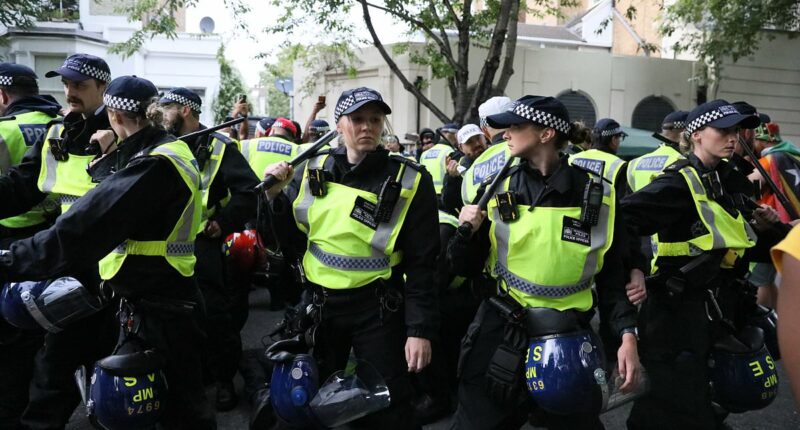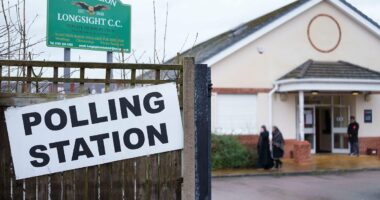Share this @internewscast.com
Police officers are worried about the possibility of being attacked, sexually assaulted, or caught in a dangerous crowd surge at Notting Hill Carnival, as apprehensions grow regarding another potentially violent weekend.
Approximately 7,000 officers and staff from the Metropolitan Police are tasked with ensuring the safety of up to two million people who will gather in the packed west London streets.
There is concern among officers about the risk of becoming separated and vulnerable to the crowd, especially since 61 officers were assaulted within just two days during last year’s event.
During the 2024 festival, police faced being kicked, punched, shoved, spat on, headbutted, and even having glass bottles thrown at them. That year, 349 people were arrested, which marked the highest number since 2019.
This week, residents and business owners along the carnival route were seen boarding up their properties to protect against potential damage over the weekend.
Simon Hill, Deputy General Secretary of the Metropolitan Police Federation, shared in a recent interview with the Daily Mail that officers’ primary concerns include being assaulted and the dangers of crowd crushing.
He said: ‘Officers are concerned about the crowd density. It is physically possible to be six feet away from a colleague and for you to not be seen or to not see them.
‘Officers are very much isolated due to density. In those isolated moments, then really they are at the mercy of the crowd – if you have people in there intent on causing harm to officers.
‘I’m especially concerned about some of our female colleagues who report being sexually assaulted. It’s just not acceptable. They don’t go to work to be sexually assaulted.

Police officers stand in riot gear at Notting Hill Carnival ‘Family Day’ in August 2024

Thousands of people pack the streets of west London for the 2024 Notting Hill Carnival

Police officers with batons during last year’s Notting Hill Carnival

Residential properties in the Notting Hill area are being boarded up this week ahead of the carnival

Simon Hill, Deputy General Secretary of the Metropolitan Police Federation, told the Mail that the two biggest concerns for officers at Notting Hill are being assaulted and crowd crushing
‘It must be dreadful for them. Some of our female colleagues are slight in build – they cannot defend themselves against a dense crowd.’
Mr Hill said officers worried about their ‘inability to protect the public’ in the event of a crowd crush, given video evidence from previous festivals shows the crowd ‘moving almost as a wave… of water’.
He continued: ‘It’s physically possible to lift your feet and be carried with the crowd in certain points. It’s a feeling of helplessness, that they are unable to protect and prevent that. There’s also the fear that they’ll actually be caught up in it.’
Mr Hill said officers were ‘very much at a risk of being victims of any crushing, as well as the public’.
Susan Hall, a Conservative member of the London Assembly, said in a bombshell report published earlier this month that the carnival in recent years had only narrowly ‘avoided a mass crush on the scale of the Hillsborough disaster’.
London Mayor Sir Sadiq Khan has warned of the risk of a ‘crowd crush’ at the carnival, saying at a meeting last month that he had ‘seen images of some of the crowds at some parts’ of the event and ‘watching them made me frightened’.
The growing popularity of Europe’s biggest street party which celebrates Caribbean heritage, arts and culture has led to politicians raising their concerns over potential crushes at the non-ticketed event, with some suggesting a move to Hyde Park.
Mr Hill backed the festival being moved to a park where it could be ticketed, although he said he accepted the ‘geographical importance of the event’ in its current location.
He pointed out that the current road layout in Notting Hill has various trip hazards such as kerbs and drains, but a park would not have as many uneven surfaces.
Mr Hill also suggested a park would have better refreshment and sanitary facilities, adding: ‘The residents come back to their front gardens being used as toilets, and that’s not acceptable.’
He said: ‘I would be surprised if there’s any event in the UK that attracts a similar number of people confined to such a small geographical space.’
The annual celebration has been running since 1966, and arrest totals have been on a rising curve since the start of the millennium. The total over the past 20 years between 2005 and 2024 is now well over the 5,000 mark.
The Met has faced increasing pressure to ensure the safety of revellers after Cher Maximen, 32, was stabbed to death by Shakeil Thibou, 20, in front of her three-year-old daughter last year, while chef Mussie Imnetu, 41, was murdered in the street.
This year, police want to identify ‘violent gangs’ planning to attend and urged anyone with information of individuals intending to engage in violence to come forward.




Cher Maximen (left), 32, and Mussie Imnetu (right), 41, were both murdered at last year’s event
But Mr Hill raised concerns that thousands of officers were being removed from their day-to-day jobs to police the carnival by the Met, which currently has a £260million hole in its budget.
He said: ‘The rest of London is being deprived of officers and resources and money for one event. Could the deployment of those officers be made better? Could the use of the money spent on the event be made better? I would suggest it probably could.’
Since 2019, police have been banned from dancing with revellers amid concerns about public perception when they are trying to deal with serious violence.
The Met confirmed this week that the ban would remain in place this year – and Mr Hill said he supports the policy despite the Met and officers being in a ‘no-win situation’.
He told the Mail: ‘If we engage with communities and people that attend the carnival, try to make it a festival spirit and hopefully keep tensions down and dancing happens to be part of that, then we get criticised for looking unprofessional.
‘If we don’t engage with the communities in that way and we don’t dance, then we get accused of being standoffish, unapproachable and not wanting to engage with the community. The Met is in an impossible position on this.’
He said the stance to not dance is ‘probably the best, because it doesn’t distract from people’s duties, the ability to stay alert and vigilant to any threats or any dangers, or any risks to the public or themselves’.
Asked about the dancing policy, a Met spokesman told the Mail: ‘Carnival is an iconic and spectacular event which attracts hundreds of thousands of people every year to party and celebrate Caribbean culture. But it is also an event where there have been numerous concerns about crowd safety and crime.
‘As a consequence, almost 7,000 officers will be deployed to this year’s event. They are there to keep revellers safe, not to join in the revelling.

Residential properties in the Notting Hill area have been boarded up this week ahead of the carnival

People walk past boarded-up properties in Notting Hill this week before the weekend’s carnival

Residential properties in the Notting Hill area boarded up this week ahead of the carnival

Security measures have been installed around properties in the Notting Hill area this week

People walk past boarded-up properties in Notting Hill this week before the weekend’s carnival

Residential properties in the Notting Hill area have been boarded up this week ahead of the carnival

Security measures have been installed around properties in the Notting Hill area this week

Residential properties in the Notting Hill area have been boarded up this week ahead of the carnival
‘We want officers to positively engage with the carnival-goers while staying vigilant at all times and remaining able to respond and intervene swiftly as necessary. They can’t do this if they are dancing.
‘The standards of behaviour expected as part of the policing operation will be communicated clearly before the event, just as they have been in recent years.’
Live facial recognition (LFR) cameras will be on the approach to and from the festival to spot suspects before the streets get crowded, with the Met confirming it still intends to deploy the technology despite campaigners claiming it is subject to ‘racial bias’.
Mr Hill said officers support the cameras because they provide an ‘additional layer of safety and security’ and could deter wrongdoers from attending the carnival by acting as a deterrent.
He added: ‘I do understand the civil liberties and the inaccuracies that potentially arise with facial recognition, but we are running out of things to try and this is the next thing to try that hasn’t previously been tried because I don’t think the technology was particular good.
‘If it makes it safer then we’re supportive of it, and I don’t see how it would make it unsafe. But I think it will make it safer, in which case, yes, we’re supportive of it.’
Responding to the claims raised by Mr Hill, Ian Comfort, chair of organisers Notting Hill Carnival Limited, told the Mail: ‘Notting Hill Carnival deplores all forms of violence. Assaults on police, who are our partners in organising this great event, are unacceptable.
‘Operationally, we listened carefully to Metropolitan Police concerns and commissioned an independent report alongside them.
‘We’re strengthening every operational element of an already extensive, multi-agency event liaison team: more trained stewards, expanded CCTV coverage, better parade coordination, faster response systems and enhanced crowd management infrastructure.’
Mr Comfort added that he met with Mr Hill and Federation General Secretary Matt Cane at Scotland Yard on December 16 last year, at his request.
He said: ‘At that meeting they accepted that Hyde Park was not a viable option. We discussed stewarding and training. I gave them my details and made it clear that I would welcome an ongoing dialogue where we could discuss and resolve concerns.

Police officers make an arrest at the Notting Hill Carnival in West London in August 2024

Some of the 7,000 police officers working at the Notting Hill Carnival in London in August 2024

People pass through metal detectors at Notting Hill Carnival in West London in August 2024
‘Despite this, they have not contacted us since, or sought any information on any organisational issues that they say their officers are concerned about.’
The Mail put this claim to the Federation but officials did not issue a further statement, although it is understood that they deny saying that Hyde Park was not a viable option.
The Mail also contacted the Met for a response on the points raised by Mr Hill, and a spokesman provided a statement on officer assaults.
It said: ‘Notting Hill Carnival is an iconic event in London’s cultural calendar which is celebrated by many from across the capital, the UK and beyond.
‘Regrettably, amongst the millions of people who have attended over many years there has been a minority intent on causing serious harm to others, including violent crime and sexual offences.
‘Last year 61 officers were assaulted who were simply doing their best to keep people safe in a challenging policing environment. This is totally unacceptable.
‘This year we will take decisive action against anyone who targets officers and where such incidents do happen we will ensure officers are fully supported.’
The Met also issued a response on crowd safety concerns, saying: ‘The Met fully supported the event organisers’ decision to commission an independent review into crowd safety after the number of situations in recent years where crowd density reached dangerous levels.
‘It was welcome news that some additional funding was secured to allow the organisers to implement a number of the review’s recommendations, but they have only had a limited time to do so meaning it’s inevitable not all the risks will have been mitigated.
‘Crowd safety remains a serious concern that must be carefully monitored and managed this year.’
Amid escalating levels of violence Deputy Assistant Commissioner Matt Ward, police commander for this year’s event, said the carnival’s size creates ‘unique challenges’.

Police officers make an arrest at the Notting Hill Carnival in West London in August 2024

Police march past Westbourne Park Underground Station in west London in August 2024

Police make an arrest at the Notting Hill Carnival outside Queensway station in August 2024
Mr Ward said ‘there has been a tiny minority of individuals intent on causing serious harm to others’ and LFR cameras, which will be outside the carnival’s boundaries, may also help revellers get home safely.
A link-up with the Elba Hope Foundation, the youth organisation led by actor Idris Elba and his wife Sabrina, aimed at helping tackle knife crime is among the measures being introduced.
LFR cameras will be used by police at the carnival to search for people who are marked as being wanted on the Police National Computer.
They will also be used to spot those who are shown as missing – including young people who may also be at risk of either criminal or sexual exploitation – and people who have sexual harm prevention orders against them because of the risk they pose, particularly to women and girls.
The cameras capture live footage of people passing by and compare their faces against a watchlist of wanted offenders. The system generates an alert if a match is detected, prompting an officer to review it and decide if they need to speak to the individual.
Further checks, such as reviewing court orders or other relevant information, are also carried out to see if the person is a suspect.
The force said that if a member of the public walks past an LFR camera and is not wanted by the police, their biometrics are immediately and permanently deleted.
But 11 civil liberty and anti-racist groups urged Met commissioner Sir Mark Rowley to scrap plans to use the cameras, arguing the equipment ‘is less accurate for women and people of colour’.
The Runnymede Trust, Liberty, Race on the Agenda and Human Rights Watch were among those demanding the plans be scrapped.

A reveller dances next to a police officer at Notting Hill Carnival in London in August 2022

A dancer gets close to a police officer at the Notting Hill Carnival in London in August 2019


Brazilian dancer Juliana Campos poses with police officers during Notting Hill Carnival in 2018
It followed a High Court challenge launched earlier this month by an anti-knife campaigner who was wrongly identified as a criminal by LFR. Shaun Thompson was held by police who demanded to record his fingerprints last year.
The Met has said it will only use the cameras at settings that demonstrate no racial bias when looking for people wanted for serious offences, such as sexual assault and knife crime.
So far this year 512 arrests have been made using the technology. The Home Office also recently announced that more LFR vans would be rolled out across the country.
The Met is also working with the Crimestoppers charity as part of a plan to keep this year’s carnival free from knife crime, serious violence and violence against women and girls.
The focus will be on deterring or preventing people who pose the greatest threat to public safety and the security of the event, the force said.
Police added that they will be using stop-and-search powers to prevent knives and other deadly weapons being carried at carnival.
It means that intelligence on violent gangs who are planning to attend the carnival is being shared with forces across the country, and banning orders are being sought against those who have a history of violence or sexual offending at the event.
A number of ‘pre-emptive intelligence-led arrests and searches’ are being used against suspects believed to be in possession of weapons or involved in the supply of drugs.
There were 160 such arrests before last year’s carnival prior to the event for offences including possession of firearms, drugs supply, rape and other serious sexual assaults.
Visitors may also have to go through screening arches which are being set up at some of the busiest entry points.
Mr Ward said: ‘Regrettably, amongst the millions of carnivalists who have attended over many years there has been a tiny minority of individuals intent on causing serious harm to others, including violent crime and sexual offences.
‘Their actions stand in stark contrast to the traditions and values of Carnival and I welcome those voices in the community who have stood up to condemn violence and serious criminality at the event.

Police show off their dance moves as the Notting Hill Carnival parade passes through in 2015

Spectators dance with police officers along the parade route of Notting Hill Carnival in 2014

A reveller poses with a police officer during the Notting Hill Carnival in August 2010
‘I fully support the organisers’ recent announcement of a new, innovative partnership with the Elba Hope Foundation to divert young people away from crime and particularly knife crime.’
He said that the ‘carnival’s growing popularity and size creates unique challenges’ and the priority for police officers and staff working across the long weekend will be to keep people safe, including ‘preventing serious violence, such as knife crime and violence against women and girls’.
A series of 31 anti-terror concrete barriers were installed on Portobello Road last month by Kensington and Chelsea Council to help deter vehicle attacks in the popular market area of Notting Hill following counter-terrorism guidance issued by the Met.
But the Council said these ‘hostile vehicle mitigation measures’ will be removed for two weeks from today to ensure ‘people can move freely and safely during the event’.
Last month the carnival’s chief executive said the event was not the cause of knife crime.
Matthew Phillip said money raised from the local council and Sir Sadiq would be put towards security measures at the event.
Mr Phillip urged people not to scapegoat the carnival, adding: ‘Knife crime is not a carnival issue. Youth violence is not a carnival issue.
‘These are serious national issues, and while some statistics have improved, the roots remain poverty, isolation, racial inequality, disconnection and the absence of hope, especially for young people.
‘Carnival does not cause these problems. It doesn’t create violence. In fact, for many, it offers relief from it.’
Concerns over safety at the carnival have also contributed to insecurity about its future, and the festival’s organisers wrote to the Government earlier this year to ask for urgent funding.
Carnival chairman Mr Comfort requested more funding from the Government to steward the event and address safety concerns, amid ongoing warnings from police that there could be a tragedy.
Eventually City Hall, the Royal Borough of Kensington and Chelsea Council and Westminster City Council provided money, allowing this year’s event to take place.
Mr Phillip said: ‘What began as a small gathering of courage on the streets of Notting Hill has grown into one of the largest cultural events in the world. That growth brings joy, but it also brings a huge responsibility. Each year, over a million people walk through these streets.
‘We are strengthening every element of our operational infrastructure: more trained stewards, expanded CCTV coverage and parade co-ordination, faster response systems for stewards and safety teams, and expanded crowd management infrastructure and personnel, to give an example of a few of the initiatives we’re embarking on.
‘These are not tick boxes. They’re a real commitment to care, to precision and to the protection of the community.’

Dancers prepare to take part in the parade at the Notting Hill Carnival in London in August 2024

Drummers perform in the parade on the second day of the Notting Hill Carnival last year
The Mail understands that carnival organisers believe crime statistics are in line with or lower than other events proportionally, and compare favourably in terms of policing costs and overall economic contribution.
They also believe arrest totals have been largely stable over recent years, despite consistent rising attendances, with last year’s arrest total making up around 0.035 per cent of the estimated one million revellers.
This is compared to an arrest rate of 0.042 per cent for fans attending professional football matches in England and Wales last season.
Last year’s arrests at the carnival resulted in 191 charges, cautions, fixed penalty notices or community resolutions, with 40 people de-arrested. Most of the offences related to drugs and theft.
Carnival is said to contribute around £400million annually to the economy – which is set against the most recently-released policing cost of £11.7million in 2023.
The carnival features parades, costumes, bands, sound systems and stages.
People will be invited to join a 72-second silence at 3pm on Sunday and Monday to honour people who died in the Grenfell Tower fire and Kelso Cochrane, who was murdered in a racially motivated attack in Notting Hill in 1959.
Last December, the Federation published the results of a survey which asked officers about the carnival – with police saying it is a ‘war zone’ and they would rather ‘crawl naked through broken glass than be on duty at it’.
Nearly 90 per cent of Met officers who responded to a survey said they had felt unsafe while working at the annual festival, while 29 per cent had been assaulted.
Asked to describe how they feel about working there, they said it was ‘hell’, ‘a war zone we are sent into year after year’ and ‘dangerous’, because ‘officers are treated as lambs to slaughter’.
One officer said the police operation was ‘overstretched, ineffective and an exercise in self-torture’, while another claimed they ‘would rather crawl naked through broken glass’.
But organisers Notting Hill Carnival Limited said the survey was ‘driven by unsubstantiated quotes and little solid data, designed to create negative headlines’.

















